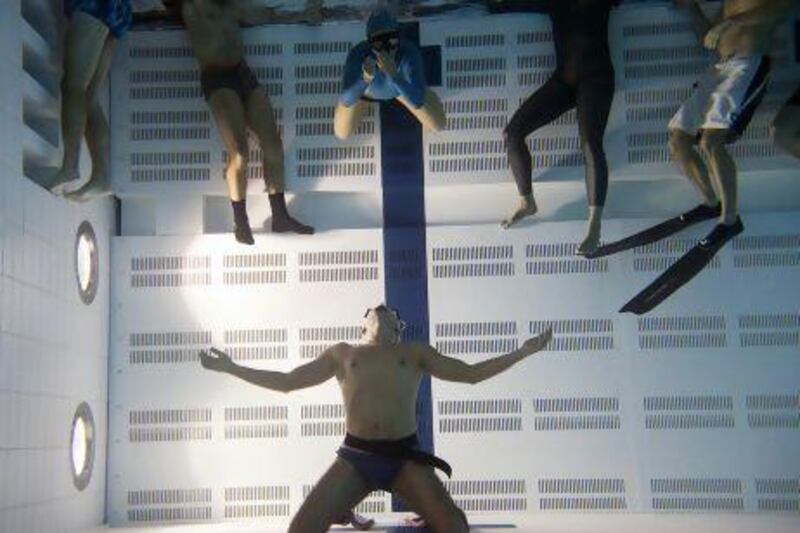"It is really easy," said Goran Colak, as he lifted up his arms and stretched them behind his back. He then bent his right leg at the knee, the heel touching the back of his thigh, and made an outward sweeping motion.
Observing the Croatian freediving champion, the movement appeared effortless. But it was not so easy for the 11 people watching him at a pool at the Hamdan Sports Complex in Dubai, who were asked to replicate the movement with both legs - while swimming on their backs.
More swimming followed with the group practising different kicks, their hands holding on to a small swimming board. The group seemed to be enjoying themselves.
"It is cool. I am learning a lot," said Philipp von Zitzewitz, 38, a conference organiser from Germany. "I swim a lot but never had supervision from a trainer. The exercises themselves are not too tiring. It is only hard to concentrate on your technique."
This is how Mr Colak, who last year set a world record by covering 273 metres in a swimming pool on a single breath, explained the need to cultivate precise swimming technique.
"Freediving is all about efficiency," he said. "You need to save your oxygen and save your energy so you can swim the most efficient way possible. The more oxygen you save, the farther you can dive."
In contrast to scuba diving, where participants are provided breathing apparatus all the time, freedivers rely on a single breath, the one they take at the surface, before submerging.
Many, such as Ayman Hajo, a Lebanese business-development manager, choose the sport for the unique connection to the ocean it provides.
"It is the purest form of sport I can think of," said the 33-year-old, who has been practising for 11 years. "You hear nothing, you see nothing but water around you. It makes you forget everything. It is just you and the ocean."
While many practise the sport simply for enjoyment, professionals compete in eight internationally recognised disciplines, some involving diving at depth with the help of fins or other equipment, swimming horizontally in a pool, or holding one's breath while remaining motionless.
The latter discipline is called apnea, and Mr Colak's record of eight minutes, 53 seconds was set at the Fazza Freediving Competition in Dubai this year. It was the second year in a row he won top spot at the competition.
Mr Colak, who quit his job as a physiotherapist three years ago at the age of 26 so he could focus on freediving full-time, said his achievements were the result of a training schedule that is almost year-round.
"You have to train a lot," he said, "I have two or three weeks of rest during the whole year."
While none of the Dubai residents taking the course were freediving professionals, some were interested in competing, said Sidahmed Talhimet, who organised the event in partnership with FreedivingUAE, a company offering specialised training in the country.
"Most of us want to set national records for our countries," said Mr Talhimet, 29, a manager for a tower crane company.
The participants, who are all based in the UAE, are originally from countries as diverse as Ukraine, Kenya, Germany, Lebanon, South Africa and the UAE.
Mr Talhimet chose to invite Mr Colak for the course because of his focus on physical training. Indeed, a good level of fitness was needed for Thursday's session.
After practising some swimming technique exercises, participants put on their freediving gear and started gliding underwater, checking their buoyancy. Safety and the best results require neutral buoyancy - when a diver floats beneath the surface, neither sinking nor rising. Besides swimming and diving, the training, which lasted from 11am until 6pm, also included an hour or so in the gym, doing aerobic exercises and lifting weights.
To be able to go deeper, freedivers must train their bodies to sustain high levels of carbon dioxide, as well as to use oxygen as efficiently as possible, Mr Talhimet said.
But while physical fitness is very important to the sport, it all begins with the mind.
"One of the most important things to learn is to relax," he said. "It is all about how you control your body with your mind and work through the pain of not breathing."
The training continues until Sunday, with the group also honing their skills in the sea off Fujairah.






